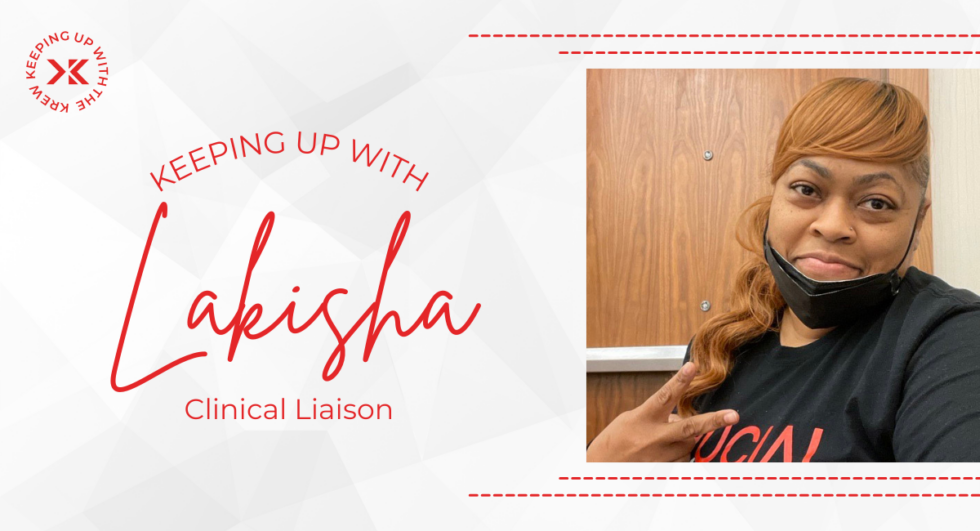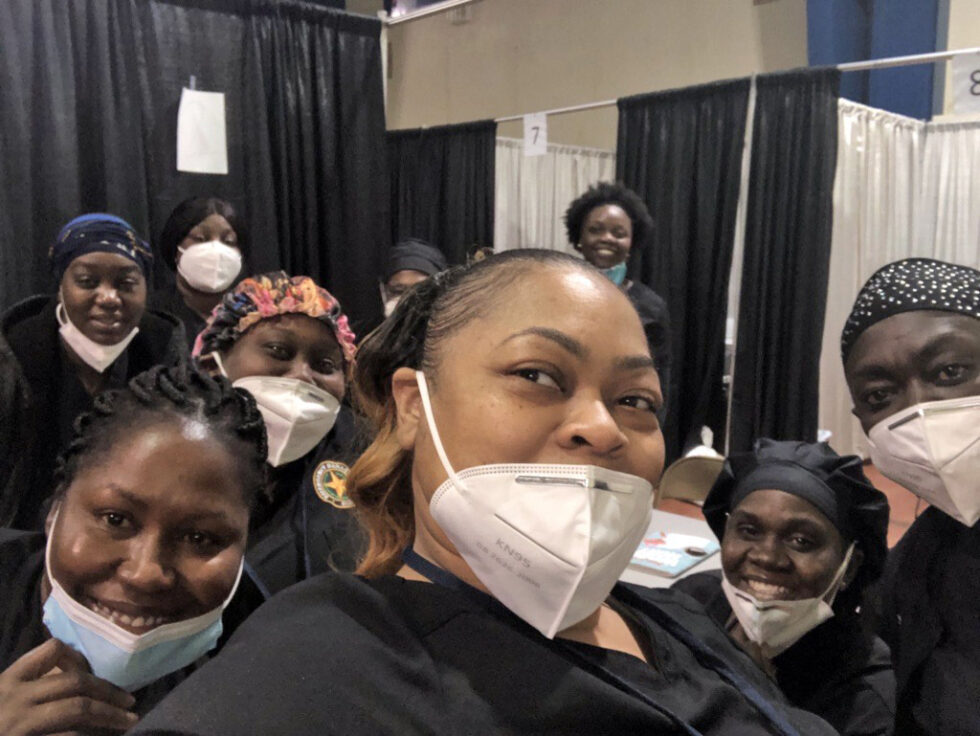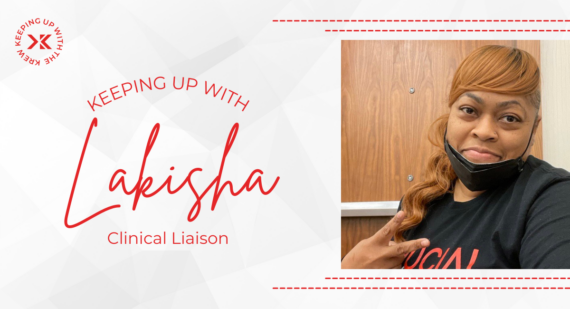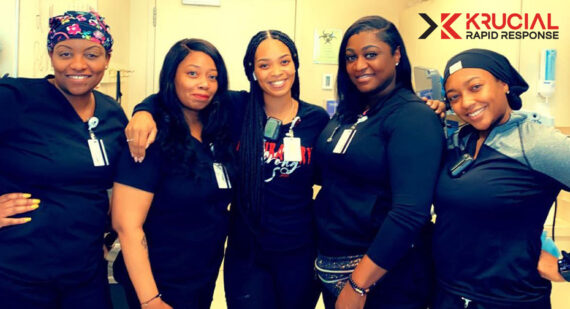
Keeping Up with the Krew: From Rural Mississippi to Official New Yorker
By: Mike Vietti
A couple of miles away from the Mississippi River, on the Mississippi side of the Memphis metro area, sits the Town of Walls. Called the “Doorway to the Delta,” about 1,500 people live in the town.
Lakisha Shivers is one of those people. Well, sort of.
Shivers hasn’t actually been “home” in more than two years. During that time, she’s been positively affecting the lives of thousands of people. And, she’s been doing it in a place 1,118 miles away that just might be the 100 percent polar opposite of Walls: New York City.
“I’m from Mississippi – I’m a country girl,” Shivers said. “I like the rural – the peace and tranquility. New York is… people, traffic, noise. All the time.”
Spending years in New York is not exactly what Shivers envisioned when she took the leap into travel nursing. In the field since 2010, Shivers holds a number of credentials – APRN, MSN, PMHNP-BC – and was working on the psych ward of a hospital near Walls before her first deployment with Krucial Rapid Response.
On August 27, 2020 Hurricane Laura slammed into the Louisiana coast as the 10th strongest hurricane to ever make landfall in the U.S. with peak winds of 150 miles per hour. More than 40 people in the U.S. alone died and thousands more were left without homes. Hurricane Laura was estimated to have caused more than $20 billion in damages.
Shivers wanted to help and connected with Krucial. Within a matter of days, she found herself working as a charge nurse in the middle of the recovery efforts in Gonzales, Louisiana.
“They told us to bring necessities such as bottles of water and flashlights, but in my head, I didn’t think I would have to use any of those things,” Shivers said. “Being there taught me life-sustaining skills and I was able to assist people who were in a vulnerable state with their health who were displaced from their homes. I had an array of emotions – some excitement, some fear. I had never done anything like that before and it was very rewarding.”
After a month-long stint in Gonzales, Shivers was on her way home when she received a phone call. She had performed so admirably that Krucial contacted her directly with another opportunity: serving as a clinical liaison.
“I was surprised and I felt euphoria because even though Krucial hadn’t been around for a long time, everyone in the nursing world knew about Krucial,” Shivers said. “I was just elated. I also didn’t know what that role consisted of, but I said ‘yes’ anyway.”
Shivers initially trained in Lubbock, Texas before traveling to Austin as Krucial had deployed thousands of healthcare personnel throughout the state to assist with Covid relief and a surge of migrants. Once again, Shivers performed exceptionally, which led to another challenging request: would she be willing to relocate to New York City and apply her expertise at a non-profit facility that really needed some help?
Going from Walls to NYC is no joke…
“It was definitely a culture shock because the people are much different in New York than down in the South,” Shivers said. “Mississippi is known as the hospitality state – people speak to you, people engage with you. In New York, on the subway, you’re encountering people who just look at you – just rude people. It was definitely something to get adjusted to.
“But I’m a people person,” Shivers said. “I feel like I don’t meet a stranger. So, wherever I am, whether it’s on the subway, whether it’s walking a couple of blocks to the facility, whether it’s inside the facility, I like to engage with people. And that’s what helped me conquer my fears. Meeting new people, asking them to take me different places or to direct me to different venues or sightseeing. I’ve met new people who have been more than a blessing to me. That’s made my experience so much better than when I first got here.”
Since becoming the clinical liaison in New York, Shivers has worked with hundreds of different healthcare professionals at a facility facing a number of challenges. Due to its location, the hospital draws large numbers of homeless, drug abuse and psych patients and working in that scenario can be taxing.
On top of that, Shivers has learned to live without copious amounts of sleep. Her typical day starts around 5 a.m. when she awakens and responds to her email to determine staffing needs for the day. After that, she travels about an hour to the facility from her hotel and essentially makes rounds to check on the staff. Shivers spends a significant amount of time developing staff schedules due to constant changes and adjustments. She juggles sick time, vacation requests, timesheets and loads of other tasks. In between, she may have several meetings to attend.
Typically, around 9 or 10 p.m., Shivers packs up and makes the one-hour trip back to her hotel. Some days, she’s lucky enough to climb into bed before midnight. Then, five hours later, she starts the whole process over again.
This begs an important question: how does she do it?
“I’ve learned that you really just need to change your mindset,” Shivers said. “I do neglect myself sometimes, but I’m learning now to take advantage of my downtime and get more rest during that time. But, it’s funny because I’ve been in emergency management for years now, so it’s like I wake up looking for chaos. If my phone isn’t ringing or if I’m not getting a bunch of emails, I’m wondering what’s going on. I feel lost.”
That begs another important question: why does she do it?
“I know I’m here for a greater cause,” she said. “What sticks with me the most is that I believe Krucial played a part in saving the community because this is the only hospital in the area. Krucial has not only helped the facility, but we’ve helped patients who had been neglected. Because we wear black scrubs and the rest of the staff don’t, a lot of the patients would say we made them feel loved and showed compassion. We weren’t used to that. And, the fact that Krucial came in and make a difference for the patients’ sake and helped save the hospital is what keeps me going.”
One more: knowing what she knows now, would she do it again?
“I definitely would,” she said. “Being here has taught me to conquer my fears. When I first got the proposition to go to New York, I was a bit hesitant because I’ve never stayed in a big city like that before. And, I didn’t know who I was going to talk to being out there by myself. I got up one day and said, ‘hey, I can’t sit in this hotel room or limit myself. I’m in this big, beautiful city. Go explore it, go find new things, go do different things.’ I definitely would do it again, no question.”
After two plus years, does that mean Shivers has officially converted from being a Mississippian to a New Yorker?
“A lot of people in New York love my accent,” she said. “People love to hear me speak, so I have fun with them using my southern country accent. But, to tell the truth, after what I’ve done, I do feel like I’m a New Yorker.”
Do you know an incredible Reservist? Nominate them by reaching out to us at social_media@krucialrr.org.






